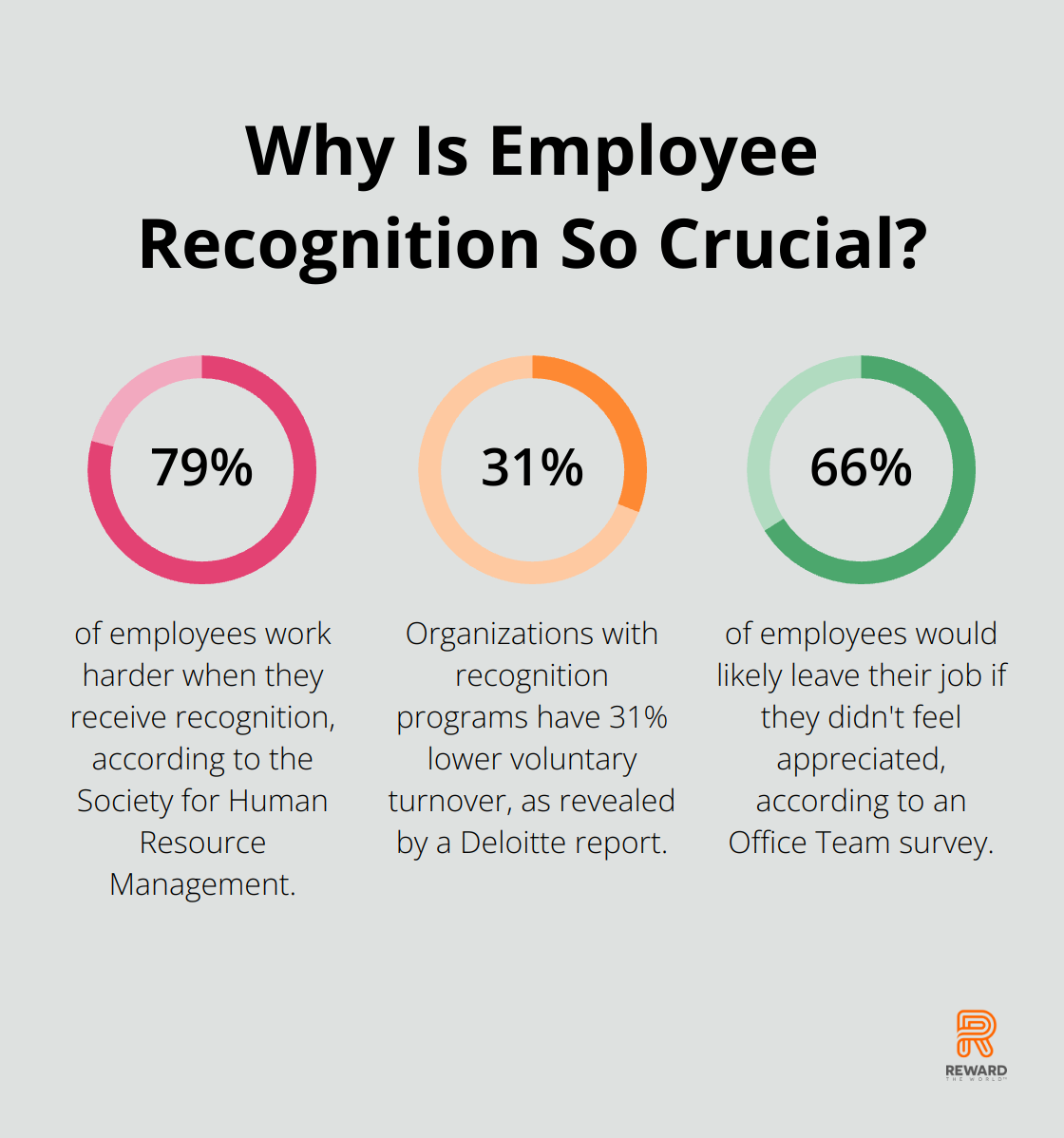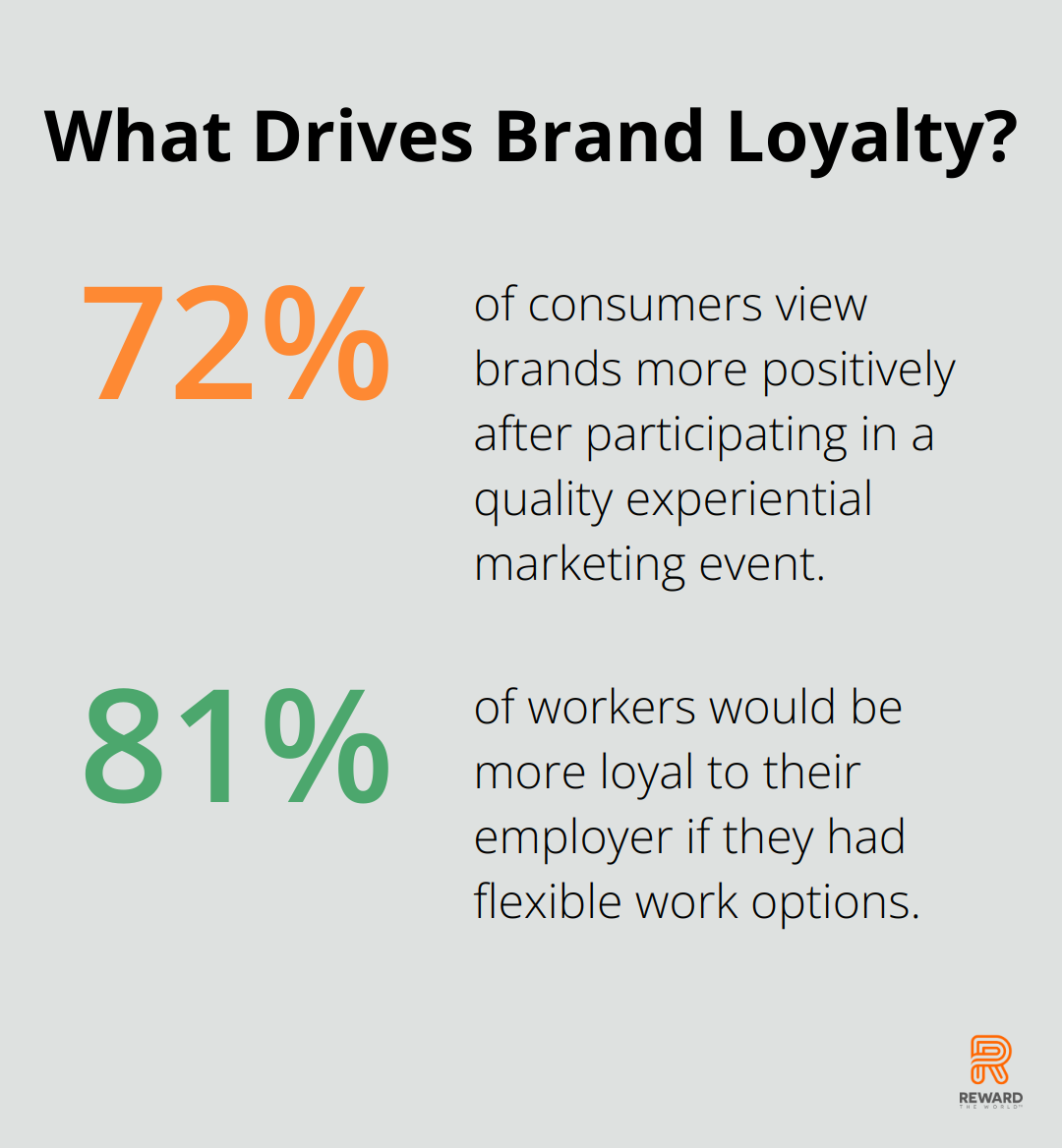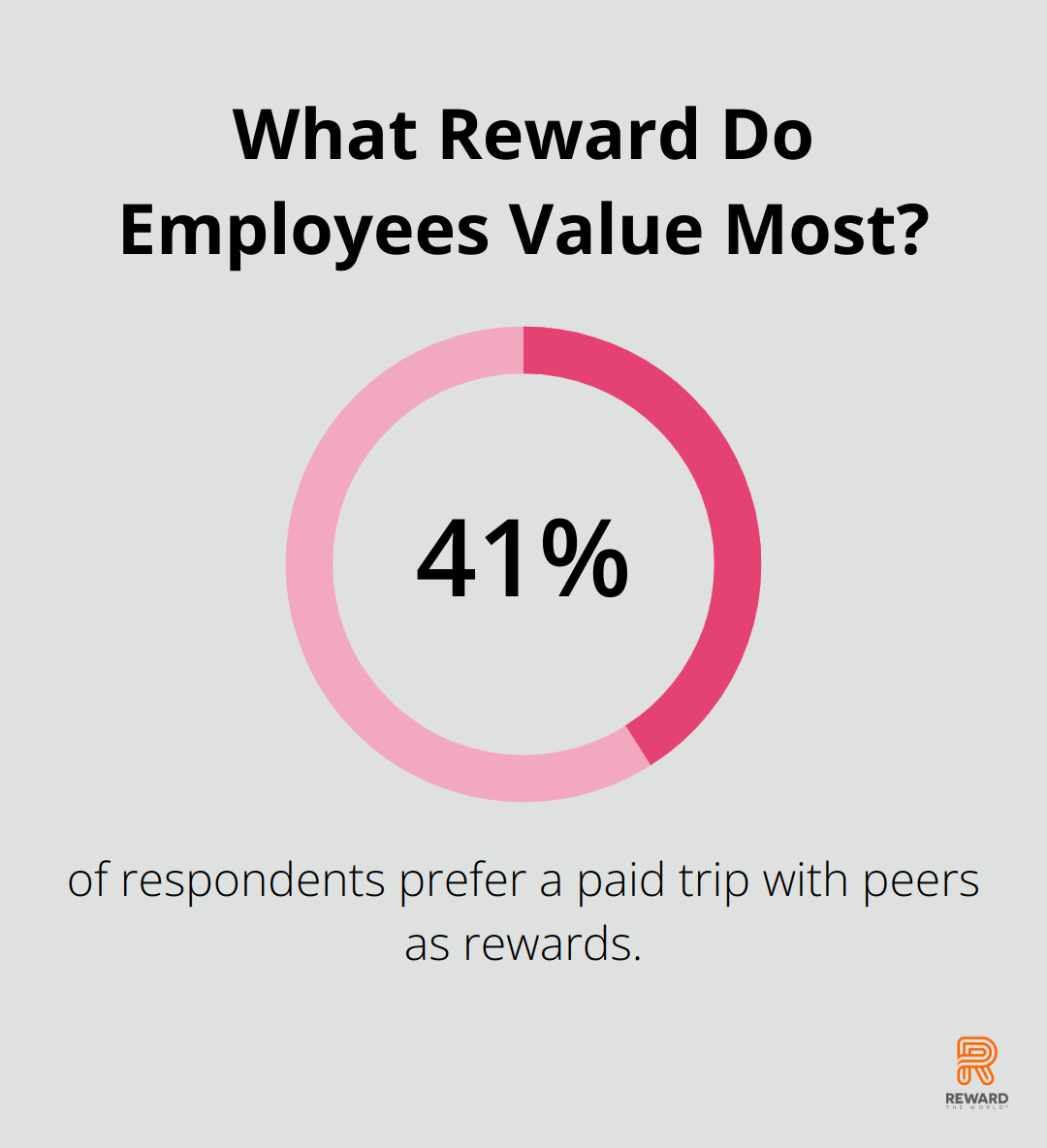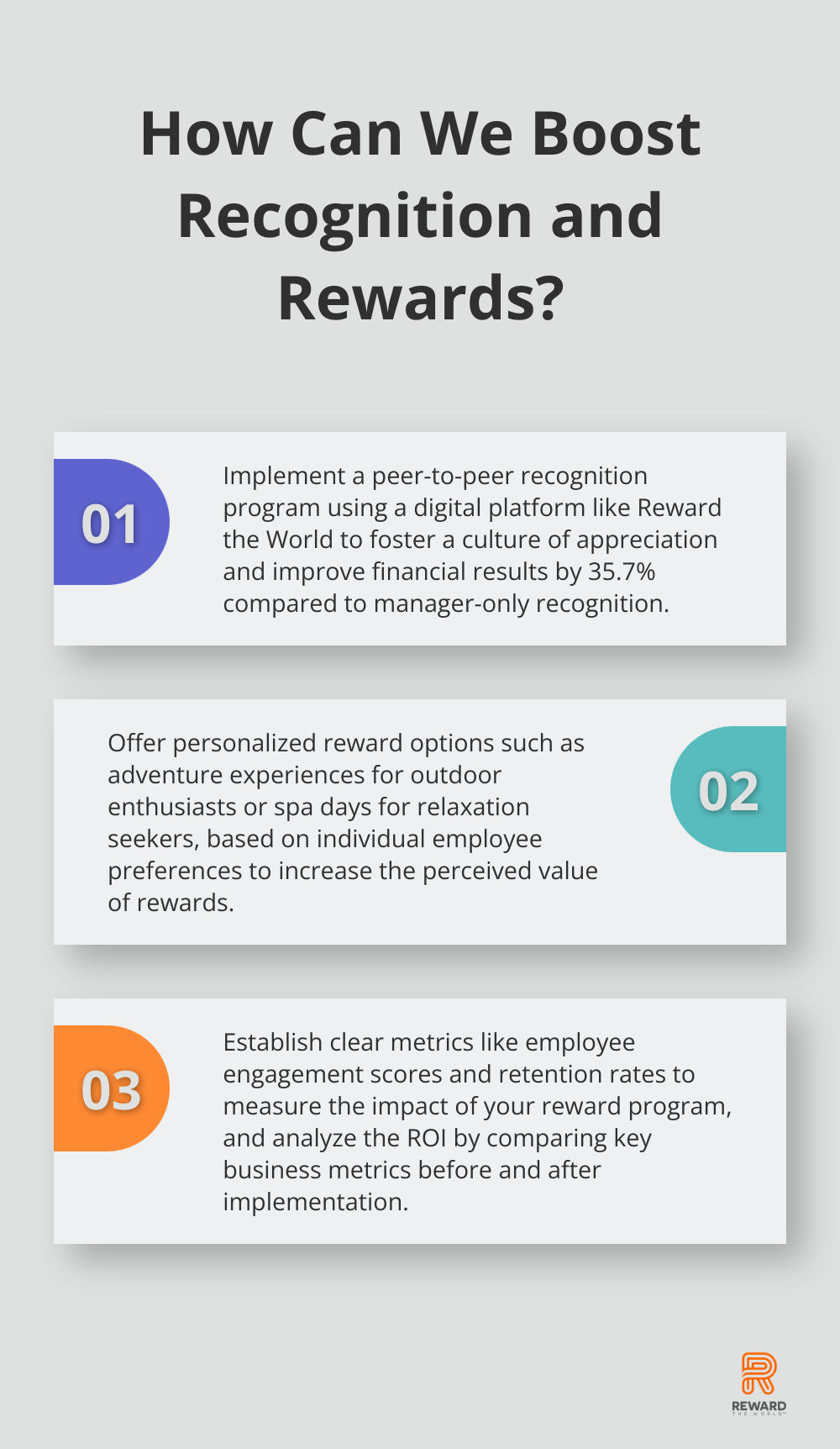
Employee rewards are a powerful tool for boosting engagement and productivity in the workplace. At Reward the World, we’ve seen firsthand how innovative reward strategies can transform company culture and drive success.
In this post: Innovative Reward Strategies: Boosting Employee Engagement, we’ll explore cutting-edge approaches to employee recognition and incentives that go beyond traditional bonuses. We’ll also provide practical tips for implementing these strategies effectively in your organization.
Why Employee Rewards Matter
Driving Motivation and Productivity
Employee rewards significantly impact business success. Companies that implement effective reward strategies see substantial improvements in their bottom line. Research shows that concentrating on employee engagement can help companies withstand — and possibly even thrive — in tough economic times. This stark difference underscores the power of a motivated workforce. When employees feel valued through rewards, they tend to exceed expectations. The Society for Human Resource Management found that 79% of employees work harder when they receive recognition.
Boosting Company Success
The connection between rewards and company success is clear. A Deloitte report revealed that organizations with recognition programs have 31% lower voluntary turnover. This retention of talent directly affects a company’s ability to innovate and compete. Moreover, these programs cultivate a positive work culture, which attracts top talent. The 2024 Global Talent Trends study explores how business executives, HR leaders, and employees are adjusting their priorities.
Diverse Reward Types
While monetary rewards (like bonuses and salary increases) remain common, non-monetary rewards gain popularity. An Office Team survey found that 66% of employees would likely leave their job if they didn’t feel appreciated, emphasizing the importance of recognition beyond financial compensation.

Non-monetary rewards can include flexible work arrangements, professional development opportunities, or even simple public recognition. Some companies offer “peer bonuses,” where employees can reward each other with small cash bonuses for exceptional performance. This peer-to-peer recognition not only motivates the recipient but also fosters a culture of appreciation among colleagues.
Tailoring Rewards to Employee Preferences
Implementing a mix of monetary and non-monetary rewards ensures that you cater to diverse employee preferences. Some may value cash bonuses, while others might prefer extra vacation days or opportunities for career advancement. The key is to offer a variety of options that align with your company’s values and your employees’ needs.
The Role of Technology in Reward Programs
Modern reward programs leverage technology to enhance their effectiveness. Platforms like Reward the World offer seamless integration and instant reward delivery, making it easier for companies to implement and manage their reward strategies. These digital solutions provide analytics and insights, allowing businesses to track the impact of their reward programs and make data-driven decisions.
As we explore innovative reward strategies in the next section, we’ll discover how companies can take their employee recognition efforts to new heights and create a truly engaging work environment.
Revolutionizing Employee Recognition
Personalized Reward Options
Companies now offer tailored reward options that cater to individual preferences. Outdoor enthusiasts might appreciate adventure experiences, while others prefer spa days or concert tickets. A survey by Incentive Research Foundation found that employee preferences are a key factor in reward effectiveness. This approach increases the perceived value of the reward and shows that the company understands each employee’s unique interests.
Experiential Rewards for Lasting Impact
Experiential rewards create lasting memories and foster team bonding. These range from group cooking classes to escape room challenges or volunteering opportunities. The Event Marketing Institute reported that 72% of consumers view brands more positively after participating in a quality experiential marketing event. The same principle applies to employee rewards – memorable experiences create positive associations with the company.
Flexible Benefits and Work Options
Flexibility has become a top priority for employees. Companies respond by offering flexible benefits packages and work arrangements. Options include choosing between additional vacation days or a bonus, or the ability to work remotely part-time. A FlexJobs survey revealed that 81% of workers would be more loyal to their employer if they had flexible work options. Giving employees more control over their work-life balance significantly boosts satisfaction and retention.
Peer-to-Peer Recognition Programs
Peer-to-peer recognition programs transform how appreciation is expressed in the workplace. These programs empower employees to recognize and reward their colleagues for great work, fostering a culture of appreciation at all levels of the organization. A study by SHRM and Globoforce found that peer-to-peer recognition is 35.7% more likely to have a positive impact on financial results than manager-only recognition. Platforms (like Reward the World) make it easy to implement and manage these programs, allowing for instant recognition and reward delivery.
Technology-Driven Reward Solutions
Modern reward programs leverage technology to enhance their effectiveness. Digital platforms offer seamless integration and instant reward delivery, making it easier for companies to implement and manage their reward strategies. These solutions provide analytics and insights, allowing businesses to track the impact of their reward programs and make data-driven decisions. Reward the World stands out as a top choice among these platforms, offering a comprehensive solution for businesses of all sizes.

As companies continue to innovate in their recognition strategies, the next challenge lies in effectively implementing these programs to maximize their impact on employee engagement and overall business success.
How to Implement Effective Reward Programs
Align Rewards with Company Values
The first step in implementing an effective reward program is to ensure it aligns with your company’s values and goals. This alignment creates a cohesive culture where employees understand what behaviors and achievements are most valued. For example, if innovation is a core value, consider rewarding employees who propose and implement new ideas. A study found that organizations with a strong sense of purpose were up to 40% more likely to retain employees.

When you design your reward program, involve employees in the process. Conduct surveys or focus groups to understand what types of rewards resonate most with your workforce. A study found that 44% of respondents prefer gift cards as rewards, while 41% prefer a paid trip with peers. This approach not only ensures that the rewards are meaningful but also increases buy-in from employees.
Leverage Technology for Efficiency
Technology plays a key role in streamlining reward processes and making them more accessible to employees. Digital platforms offer user-friendly interfaces that make it easy for managers to recognize employees and for employees to redeem their rewards. These solutions also provide valuable data and analytics, allowing you to track the effectiveness of your program and make data-driven decisions.
When you select a technology platform for your reward program, consider factors such as ease of use, integration capabilities with your existing systems, and the variety of reward options available. Look for platforms that offer real-time recognition features, as immediate feedback has proven more effective in reinforcing positive behaviors.
Measure and Analyze Program Impact
To ensure your reward program delivers the desired results, it’s essential to establish clear metrics and regularly measure its impact. Key performance indicators (KPIs) might include employee engagement scores, retention rates, productivity levels, and even customer satisfaction metrics.
Use surveys and feedback mechanisms to gather qualitative data on how employees perceive the reward program. This information can provide valuable insights into areas for improvement and help you refine your strategy over time.
Try to analyze the return on investment (ROI) of your reward program. While it may be challenging to quantify the exact impact, you can look at trends in key business metrics before and after implementing the program. A study found that well-designed incentive programs can increase performance by up to 44%.
Choose the Right Reward Platform
Selecting the right reward platform is critical to the success of your program. Look for a solution that offers a wide range of reward options to cater to diverse employee preferences. Reward the World stands out as a top choice among these platforms, offering a comprehensive solution for businesses of all sizes.
A good platform should provide:
- Instant reward delivery
- Multiple reward types (e.g., eGift cards, cash payments, points)
- Robust analytics and reporting features
Continuously Improve Your Program
The most successful reward programs evolve with the changing needs of your workforce and organization. Regularly review and update your program based on employee feedback and performance data. Try to stay informed about industry trends and best practices in employee recognition (this can help you keep your program fresh and effective).
Consider creating a dedicated team or committee responsible for overseeing and improving your reward program. This group can gather feedback, analyze data, and propose updates to ensure your program remains relevant and impactful.
Final Thoughts
Innovative reward strategies have become essential for businesses to boost employee engagement and drive success. Companies can create a culture of appreciation that resonates with their workforce through personalized rewards, experiential incentives, flexible benefits, and peer-to-peer recognition. These approaches transcend traditional monetary rewards and address the diverse needs and preferences of employees.

Effective reward programs yield substantial long-term benefits, including increased employee motivation, higher retention rates, and improved productivity. They foster a positive work environment that attracts top talent and enhances overall company performance. Organizations with strong recognition programs experience lower turnover rates and are more likely to achieve their business goals.
Businesses must align rewards with company values, use technology for efficient delivery, and continuously measure and adapt programs based on employee feedback and data-driven insights. Reward the World (https://rewardtheworld.net) offers a comprehensive platform that can help organizations streamline their reward processes, providing instant delivery of various reward types and robust analytics to track program effectiveness.
